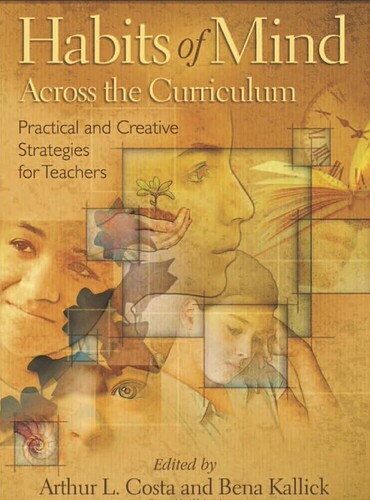I’ve recently been reading Habits of Mind Across the Curriculum: Practical and Creative Strategies for Teachers, and revisiting some of the Habits of Mind and thinking about them in relation to STEM and robotics in new ways. The Habits of Mind are defined as “dispositions that we want students to develop so that they are more capable of successfully working at a higher level. The habits are not another layer that is added on to an already over crowded curriculum.” This idea of dispositions was always something that appealed to me as a Kindergarten teacher, as much of the work we do is essentially around teaching children how to “do school”, and developing dispositions for learning.
In my classroom, many of the Habits of Mind seemed like a natural fit – like Listening with Empathy and Understanding, Managing Impulsivity, or Responding with Wonderment and Awe were a HUGE part of the daily life in our classroom. Looking at the habits through the lens of a STEM or robotics teacher however, I feel like Listening is still important, but other habits like Persistence, Thinking Flexibly, Striving for Accuracy and Precision come to mind as having more relevance.
I’m curious about how teachers across all grade levels are incorporating Habits of Mind into their classroom. Is this something that you pay specific attention to, or is part of your school culture? Or is it just something that happens to occur in the right setting? Are there any strategies that you’ve found particular useful in helping students develop a particular habit over time? I look forward to hearing your thoughts!
1 Like
Managing impulsivity is a big habit that I tried to explicitly address in some of my camps and classrooms.
The biggest challenge for the students was the impulse to add things to the robot or to the code with little to no planning. Encouraging students and campers to take the time to think about what might happen when the block or the part was added helped them to slow down and make more meaningful reflections on their robot build or code. I tried to encourage this slowdown with a few questions/reminders on the whiteboards around the classroom (so they could constantly look at these for reminders if they were working in groups)
- Take a breath and wait 10 seconds.
- What problem are you trying to solve?
- What is one thing that could help you solve the problem? (“thing” changed to piece or block depending on if we were working on building or coding)
- Ask another team for an idea. Share your knowledge!
Taking a break and walking around to talk to other teams were some of the most effective strategies (from my observation). The act of walking away from the problem that was causing frustration and the desire to make rapid, impulsive changes, helped the campers to change their mindset and take a little reset.
This is such a great question, @Audra_Selkowitz and I cant wait to see some of these other strategies!
1 Like
As a former principal, I have thought a great deal about how teachers can help develop the habits of mind in their students by modeling them through their own language and approaches to problem solving, as well as through the questions they ask in class.
For example, to help develop the habit of Persisting, teachers can share examples of how they themselves have faced a difficult problem or challenge, failed, learned from their failure and tried again until they ultimately succeeded. They can prompt students to think about persisting by asking questions such as, “What was an obstacle you faced when trying to solve that problem, and how did you overcome it?” or “How did you feel when you were able to work through that challenge and finish that project?”
To help students develop the habit of Thinking About Thinking teachers can think aloud when they are working through a math problem or ask students things such as, “Can you guide us through the steps you took to solve that problem?” or “What led you to try that approach, and how did you change your strategy as you worked your way through the problem?”
When teachers model the Habits of Mind for their students, it validates them for the students and gives them a safe environment in which to cultivate them in themselves.
1 Like
I love the way you framed your closing, @Aimee_DeFoe, about the value of teachers modeling - “if validates them for the students and gives them a safe environment in which to cultivate them”. The Habits of Mind are part of a larger classroom culture, and the teacher should be just as much a part of that culture as they wish their students to be.
1 Like

